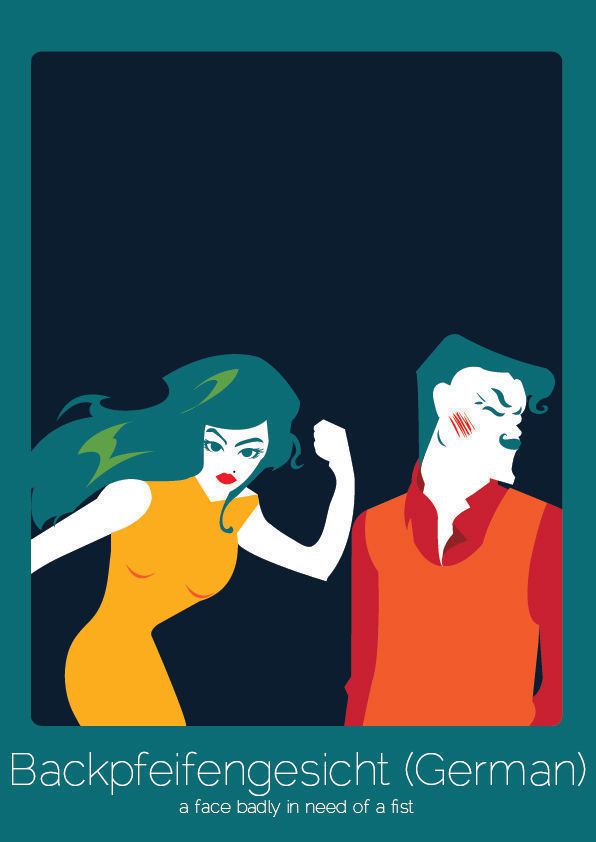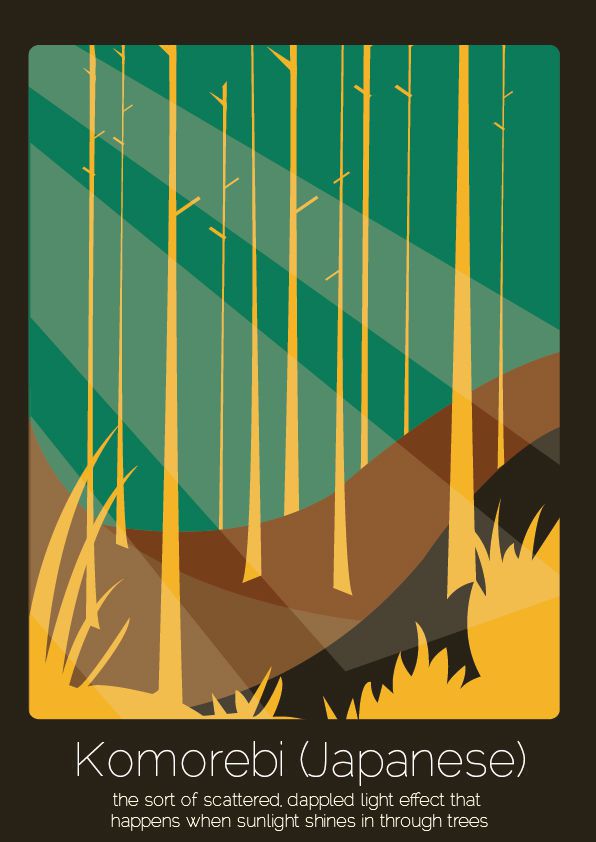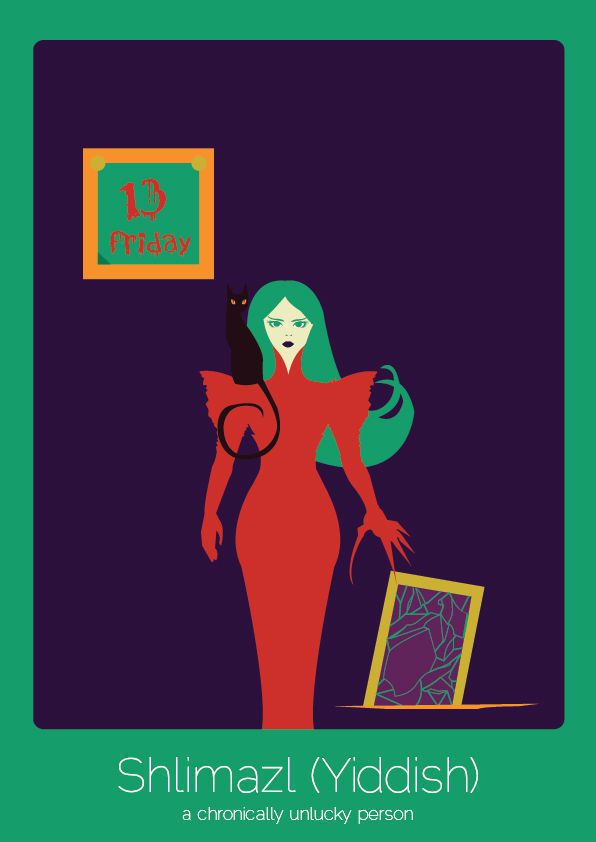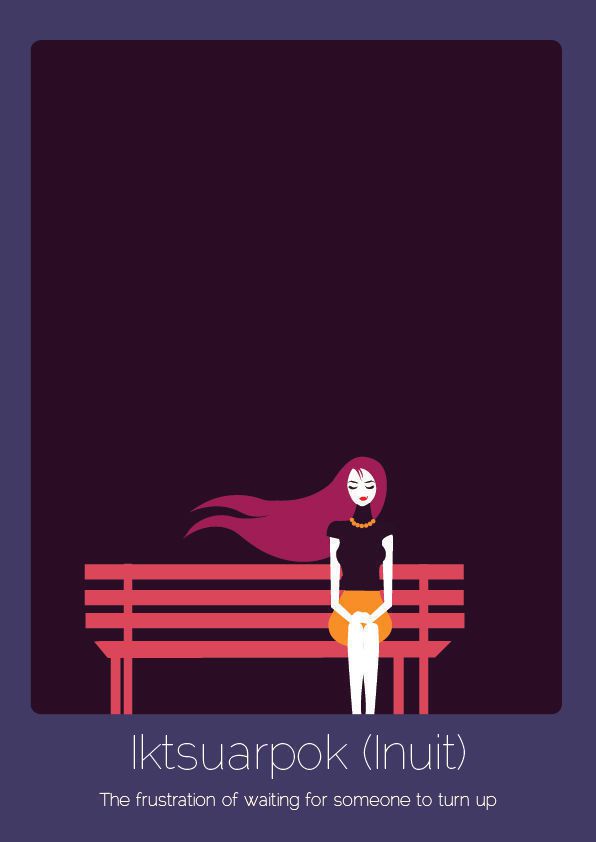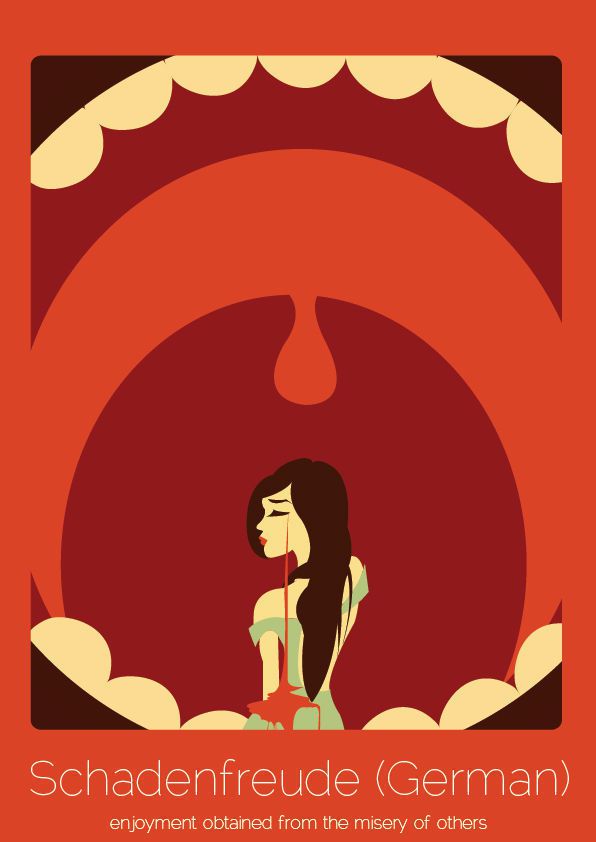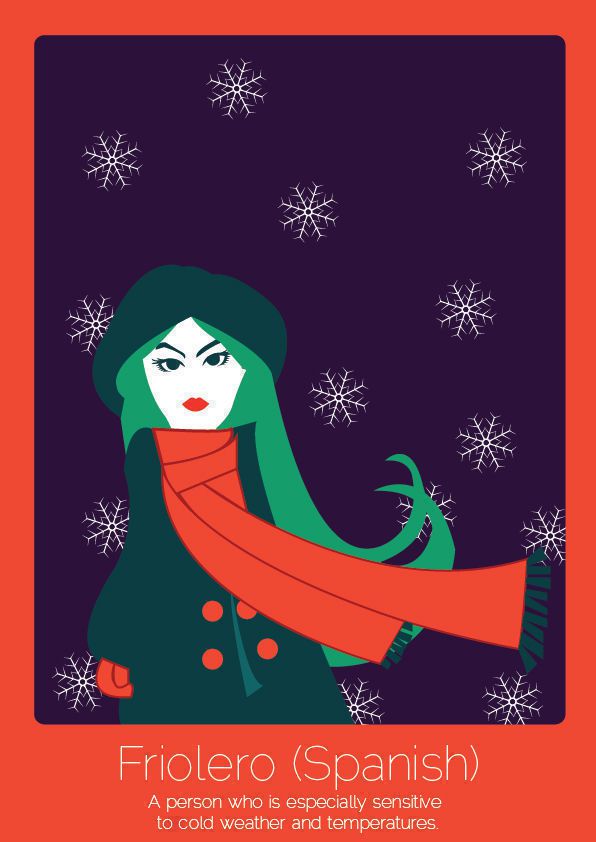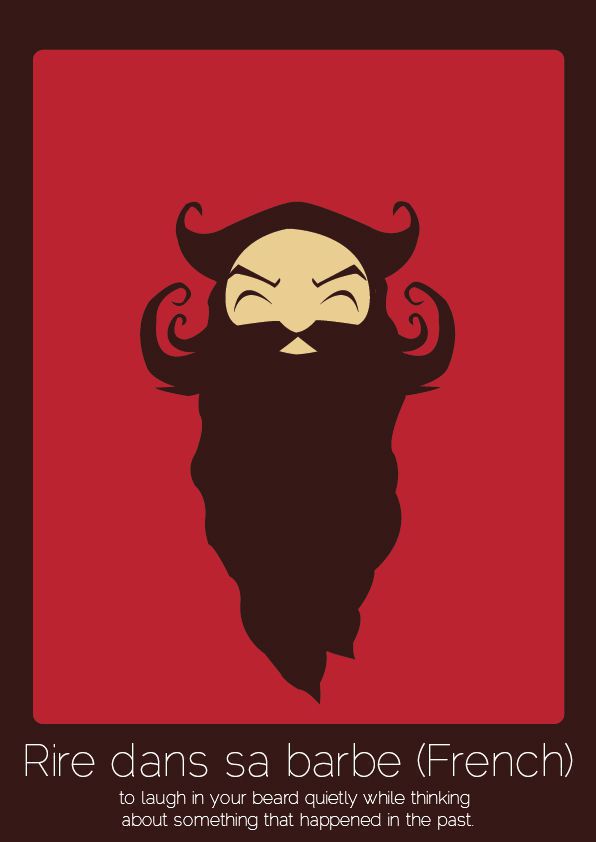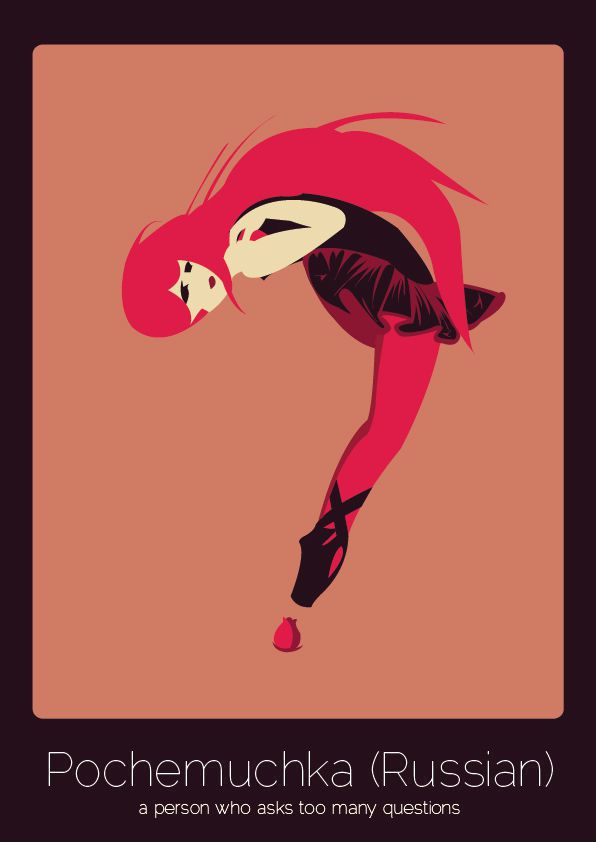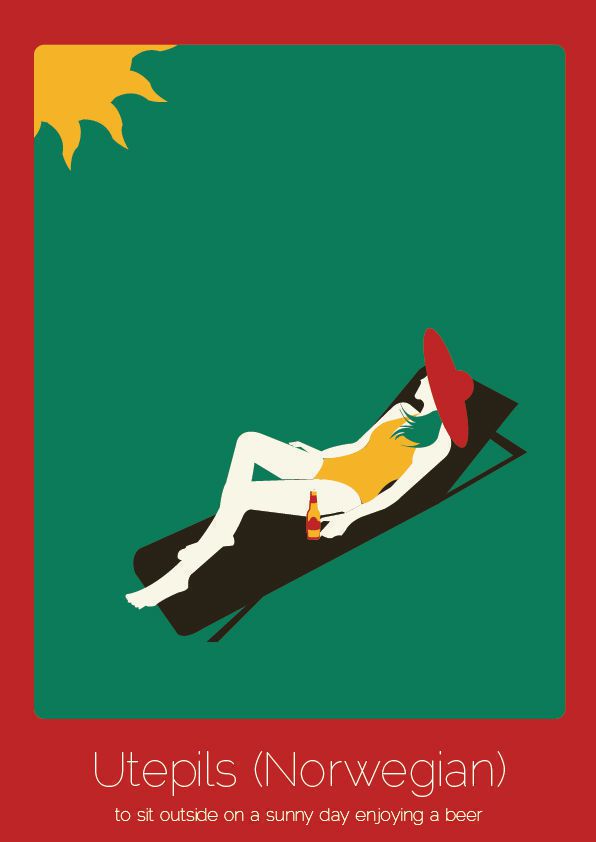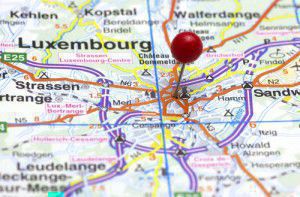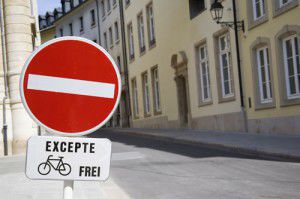Found in translation – untranslatable words, in pictures
If you liked our recent infographic on words that don’t exist in English, you’ll love this. New Zealand-based designer Anjana Iyer has been working on a project called Found in Translation, illustrating 41 ‘untranslatable’ words so far, with more to come.
We asked Anjana about the background to her project, and where she gets her ideas from. Here’s what she had to say…
What’s the 100 Days Project all about? How did you get involved?
The 100 Days project is basically choosing one creative exercise, and then repeating it every day for 100 days. It was started three years ago by Emma Rogan, who is quite a renowned senior designer in New Zealand. I came across this through one of the creative meetups happening in Auckland every week, and I decided to participate to improve my illustration skills.
What made you choose untranslatable words for your subject?
I wanted my 100 Days project to be something compelling enough to do every single day. I have had a fascination with learning new languages for the longest time and I just happened to come across this article about 14 words with no English equivalent on The Week. I knew I wanted to base my project around illustrations, since I have only been illustrating for the past two years and I still have a very long way to go, and this was a perfect medium to improve my skills.
This project was started last year as a part of the 100 Days project but I had to drop it after Day 41 due to some professional and personal commitments. It’s suddenly been brought to spotlight because of my friend who recommended me to DesignTaxi and it went viral from there. And with the growing response that it’s gotten, I have restarted the series to include more illustrations.
How did you choose which words to illustrate?
Well, when I first came across these words, I could think of one friend or another when it came to certain words. For example, the Yiddish word Shlimazl (which means a chronically unlucky person), reminded me of a classmate who had the worst luck with our professors. And so I picked words which we could all relate to in way or another and maybe share a laugh or two.
Do you have a favourite so far?
Iktsuarpok has a been a favourite word, simply cause it holds so much meaning. It’s waiting, whether you are waiting for the bus to show up or for the love of your life. It perfectly describes that inner anguish. From the point of view of illustration, I am very happy with how Schadenfreude turned out. That was fun to illustrate.
What’s your background as a designer?
I am a media designer with three years of experience. I love illustration and web design in equal measure. I quit engineering to become a designer. When it comes to illustrations, I love doing mostly vector work. Currently I am in the final year of my studies as a web design student.
Do you speak any languages yourself?
Well, being from India, I think we are born to speak several languages. I do speak about five Indian languages and I have a working understanding of French.
Can you give us a sneak preview of any forthcoming illustrations?
It’s quite surprising how some words can really unite people. The Portuguese word Saudade is such a popular one. I have lost count of the number of people who have requested an illustration of said word. And I am looking forward to completing that one.
To see some of her other illustrations, check out Anjana’s website.
Thanks to Anjana for talking to us; we’re looking forward to seeing more of her brilliant work!
Do you have any favourites? Or any words you’d like to see illustrated? Let us know in the comments.
What’s so good about Eurovision?
This Saturday is the final of the Eurovision Song Contest 2014 in Denmark, with 125 million people expected to watch across Europe and beyond. The contest, now in its 59th year, has become known for its wacky performances and tends to divide opinion; while some people love it (although maybe not as much as this man), others claim to find it tacky. But I think most people can agree that whether you take it seriously or not, Eurovision is good fun. (Even if sometimes you need a drink or two to help you through it.) Here are our ten favourite things about Eurovision:
1. Russian Grannies
I had to put this first because it was one of my favourite ever Eurovision moments. The song on its own is fairly forgettable, but what made it amazing was the elderly ladies who managed to incorporate baking into their performance at the 2012 contest. I’m still not sure what it had to do with a Party for Everybody, but it was brilliant, and I’m still disappointed that it didn’t win.
2. Riverdance
The Irish dance act were first discovered when they performed during the interval of the Eurovision Song Contest in 1994. Known for its amazing synchronicity, energy and rhythm, Riverdance went on to become a worldwide phenomenon. So if you’re not a fan, now you know who to blame.
3. Romanian rivalries
In the UK, it’s not seen as very ‘cool’ to enjoy Eurovision, but some other countries take it incredibly seriously. In Romania, for example, it’s a really big deal and apparently it’s traditional for the acts to try and win a place by discrediting their opponents.
4. The voting
How could I not mention the political voting? Half the fun of Eurovision is predicting who’s going to give points to who. Greece and Cyprus usually vote for each other, as do the Scandinavian countries and the Balkans. If that sort of thing interests you, this is a useful summary. Unfortunately, the political voting tends to leave the UK in a precarious position; we often get votes from Ireland, and sometimes Malta, but not very often from anyone else…
5. The UK
While we’re on the subject, let’s take a look at the UK’s Eurovision record. It’s hard to believe looking at recent history, but apparently it’s one of the most successful countries, winning five times since our first appearance in 1957. The last win was in 1997, with Katrina and the Waves, and since then we’ve not been doing so well, finishing last three times. The first of these was in 2003, when we scored an embarrassing ‘nul points’. Apparently this year’s entry, Children of the Universe, by singer-songwriter Molly, is expected to do well. I’ll believe it when I see it.
6. ABBA
It’s not often that a Eurovision act goes on to have a successful long term career, but one exception is Swedish group ABBA. Not only did they win the contest for Sweden in 1974, they went on to sell over 380 million albums worldwide. Their music also featured in the hit film Muriel’s Wedding and the award-winning musical, Mamma Mia! (And the movie version, which introduced the world to the singing ‘talents’ of Pierce Brosnan.)
7. Alcohol is Free
Regardless of your views on drinking, it’s hard not to tap your foot along to Alcohol is Free, by Koza Mostra and Agathonas Iakovidis, a.k.a. the Greek answer to Madness. They finished sixth in 2013.
8. Finland
We love Finland; they always come up with something memorable. Last year was the catchy Marry Me, which ended with that kiss, but nothing beats 2006 entry Hard Rock Hallelujah, by Lordi. Eurovision isn’t known for its heavy metal, preferring to stick to happy songs about how we should all love each other. But the alternative approach seemed to do the trick; the band won that year’s contest.
Warning: this video contains flashing lights and monster masks!
9. Language rules
Eurovision used to have a very strict rule about countries only singing in their native language, which has been lifted and restored a few times over the years. These days, many of the competing countries choose to perform in English, but some remain loyal to their own language; France and Spain are two examples. When I was growing up, there were more songs in other languages than there are today, and we used to enjoy turning on the subtitles and watching them struggle to translate the lyrics. Songs in English have won 28 times, followed by French, with 14 wins.
10. Fairytale
This was a popular choice in the EuroTalk office. Every now and again, Eurovision does actually produce a good song, and Fairytale was the one that we all thought of. The Norwegian entry for 2009 featured violinist Alexander Rybak, and won with a record-breaking 387 points out of a possible 492. For some reason, Alexander and his dancers were also a bit of a hit with the ladies…
Have we left out your favourite thing about Eurovision? Let us know in the comments!
Liz
How learning a language can help your career
 “Learning a different language has made me the person I am today. I enjoy working with global brands in over 18 different countries, and leading a team specialised in 5 different markets.”
“Learning a different language has made me the person I am today. I enjoy working with global brands in over 18 different countries, and leading a team specialised in 5 different markets.”
Sarah works as a Multilingual Search Manager at Search Laboratory, and she’s taken time out to tell us why and how learning a language has helped her develop her career.
Q. Your experience of learning a language…
– When did you start?
I started learning another language at the age of seven, when my family moved to Germany. I often say that I learnt the language by watching TV, but it was actually a combination of listening (which did involve TV), reading (mainly as schoolwork gave me no choice – I wasn’t the bookworm then that I am today), and being thrown in the deep end. If there’s no other communication option around you, you will pick up a language. It just might take some time.
– How did you get into languages?
I got into it through video tapes for children designed to help learn a second language, and then through tuition and being surrounded by the language in everyday life. For the first six months of living in Germany I went to an English school, but then transferred to a German one, so speaking the language was a must for grades, making friends, and just generally communicating.
– What was hard?
The first few months were pretty tricky. I’m known as a bit of a chatter-box (this is likely to come across in my answers), so not being able to communicate was tough, but also an incentive to just try the language and learn by doing. The best way to learn a language is to speak it. It’s also the scariest thing about learning a language.
These days the main challenge is remembering the right word for the right language. With two languages buzzing in my head, I can often recall the perfect word for what I want to say, but in the wrong language for the situation.
Q. How you have found being multilingual useful when searching for employment and building a career?
 Being multilingual has been very useful for my career, as it’s given me more options, and I think it’s also helped me stand out a bit in the employment crowd. This was especially true when I was younger, and just starting out. Though multilingual isn’t as unusual as you think these days.
Being multilingual has been very useful for my career, as it’s given me more options, and I think it’s also helped me stand out a bit in the employment crowd. This was especially true when I was younger, and just starting out. Though multilingual isn’t as unusual as you think these days.
It was also a way for me to narrow down my career search. I knew that I wanted to be part of a company that provided opportunities for multilingual speakers, and was equally interested in different cultures and understanding different markets.
Q. How do you use languages in your everyday role as a Multilingual Search Marketing Manager?
I manage our French, Spanish, Italian, Russian and Chinese team, so the language alone doesn’t help out; however, the language experience is vital. I feel that because I went through learning a language and living in a different country that I’m more empathetic to and understanding of the struggles of day to day life (or at least some of them – the team may disagree).
I also think that the language experience has made me very inquisitive about other cultures, and languages, which really comes in handy when looking into the differences of search behaviour and trends in other markets.
Q. Why do you think more people should learn more languages?
Because it’s great fun! And because it can open up career opportunities that you hadn’t even thought of yet.
I sometimes forget that I’m classed as multilingual as having more than one language is natural to me, to my family, and most of the people I work with. I think I’d be pretty bored if I only had one language to rely on.
Also, looking back and seeing all the opportunities I might have missed out on, is a bit of a scary thought.
I’m excited to learn more languages, though can’t decide of the languages which my team speaks, which one to start with. There’s just too much choice!
Do you use languages at work? Have you found knowing more than one language has helped you in your career?
8 common language mistakes to avoid [infographic]
When you’re learning a new language, it’s easy to make mistakes. And that’s ok; it’s the best way to learn. But sometimes you might think you know what you’re saying, and actually you’ve said something very different. Here are a few examples to look out for…
Please let us know your own examples and as always, do feel free to share the infographic with others.
Infographic created by Adam (research) and Luke (design)
Embed This Image On Your Site (copy code below):
10 reasons to visit… Luxembourg
Having just returned from a short trip to Luxembourg, I thought I’d continue with our ’10 reasons to visit’ series by giving you a few reasons why you should consider a trip to this central European country.
Luxembourg may be small, but it’s certainly worth a visit, and here’s why:
1. Great links with the rest of Europe
Luxembourg is just a short, hour-long flight from London, with several airlines and airports serving Lux airport. Our return flights were only £60 with BA. Or you could easily fly or drive from most big cities in Europe. Luxembourg also uses the Euro, which is convenient for other European visitors.
2. It’s quick and easy to visit France/Germany/Belgium
Ok… so my second reason to visit a place probably shouldn’t be that it’s easy to leave it again, but hear me out! I spent five days with a friend who lives in Luxembourg city, and during that time we hopped on the train over to the border to Trier in Germany and Nancy in France for just 10 euros a time. Luxembourg’s central location and small size means it’s easy to get two or three countries for your money by taking a short drive or train ride to one of the nearby cities, and fit as much as possible into your trip.
3. Linguistic diversity
Of course, my next reason has to be language-related! This small country has THREE official languages: Luxembourgish, which is spoken as a mother tongue by almost all residents; French, which is commonly used in restaurants, shops and cafes, and German which is frequently heard in the media. English is also widely spoken. So while you’re there, you can easily practise your French or German, as well as maybe picking up a few phrases of the local language. It was definitely a good opportunity for me to use a bit of French when ordering food and drinks. (By the way, EuroTalk offer all three official languages.)
4. Food and drink
Luxembourgish cuisine is very similar to German/Austrian, with plenty of meat and potato-based dishes. I came across plenty of my favourite German dishes such as Kaesspaetzle (an egg based dish which is a little like pasta or dumplings, with plenty of cheese!), Schnitzel (breaded pork fillets) and Rosti (Swiss-style potato cakes), not to mention Apfelstrudel and cheap beer. But if heavier dishes are not to your taste, there are plenty of French and Italian influenced restaurants in the city as well.
5. Amazing architecture
Luxembourg City used to be a fortress city which was completely surrounded by high stone walls. Those walls are still there, and you can climb to the top and walk around them for an incredible view of the city. The architecture is also beautiful, with many typical cone-shaped roofs and an architectural style that mixes French and German traditions. Planning and building laws in Luxembourg are also much looser than in many other European countries, meaning almost all the houses are built in different styles and colours.
6. Museums and culture
We visited the Luxembourg City History Museum, which is only 3 euro entry, but worth every cent. The museum covers every aspect of Luxembourgish life, from exhibits on the city’s architecture, with models of the city during different periods of its existence, to an entire floor dedicated to shopping and consumer culture, a basement level which is cut into the rock that the city is built on, and loads of fascinating information about the city’s occupation by the Nazis during the WW2 era. It also has great views over the city, especially from the glass lift. The museum is a proper maze and you can get lost in there for hours and find out about all sorts of aspects of Luxembourg City.
7. Landscape and cityscape
Interestingly, the city is built around a huge canyon (for want of a better word!). You must therefore either take one of the city’s many bridges to get to the other side, or you can walk down into the canyon and explore the park, which has a small river and beautiful views. Many people go running or cycling down there, and it’s a great place to chill out or take a walk.
8. Nature is close at hand
The city is full of green spaces, including parks and the river, and you’re never more than short walk from a green area to chill out and relax. However, a short trip outside the city and you’ll be in the midst of the country’s miles and miles of relatively unspoiled countryside. Luxembourg is great for cycling, hiking and fishing or boating. There are also 400 square kilometres of nature parks, many lakes and rivers and miles of cycle routes and hiking trails. As a bonus, the city is also very bike-friendly. You can rent a bike from the Veloh scheme, and there are bike lanes everywhere so you can cycle safely.
9. Shopping!
Unfortunately, Luxembourg isn’t the cheapest place to go on holiday. Wages there are high and the city’s livelihood is largely based on banking. As a result, food prices, for example, are relatively high. However, Luxembourg City and some of the surrounding cities are great places to shop, especially if you’re interested in high-end boutiques and designer labels. If you’re looking for flea markets or bargain hunting then it’s probably not the place for you, but there are several quaint little artisan chocolate, cheese and wine shops, as well as a wide range of designer stores which are worth a look, even if you’re only window shopping.
10. Visit the only remaining grand duchy
Luxembourg is not only one of the smallest sovereign nations in Europe, it’s also the world’s only remaining grand duchy, meaning it’s headed by a grand duke rather than a king/queen or president. You can see the grand duke’s palace in the centre of the city, and his son was recently married in a huge public ceremony which was watched by most of the nation. You can also see the country’s main legislative building, the Chamber of Deputies, right in the city centre.
Alex
